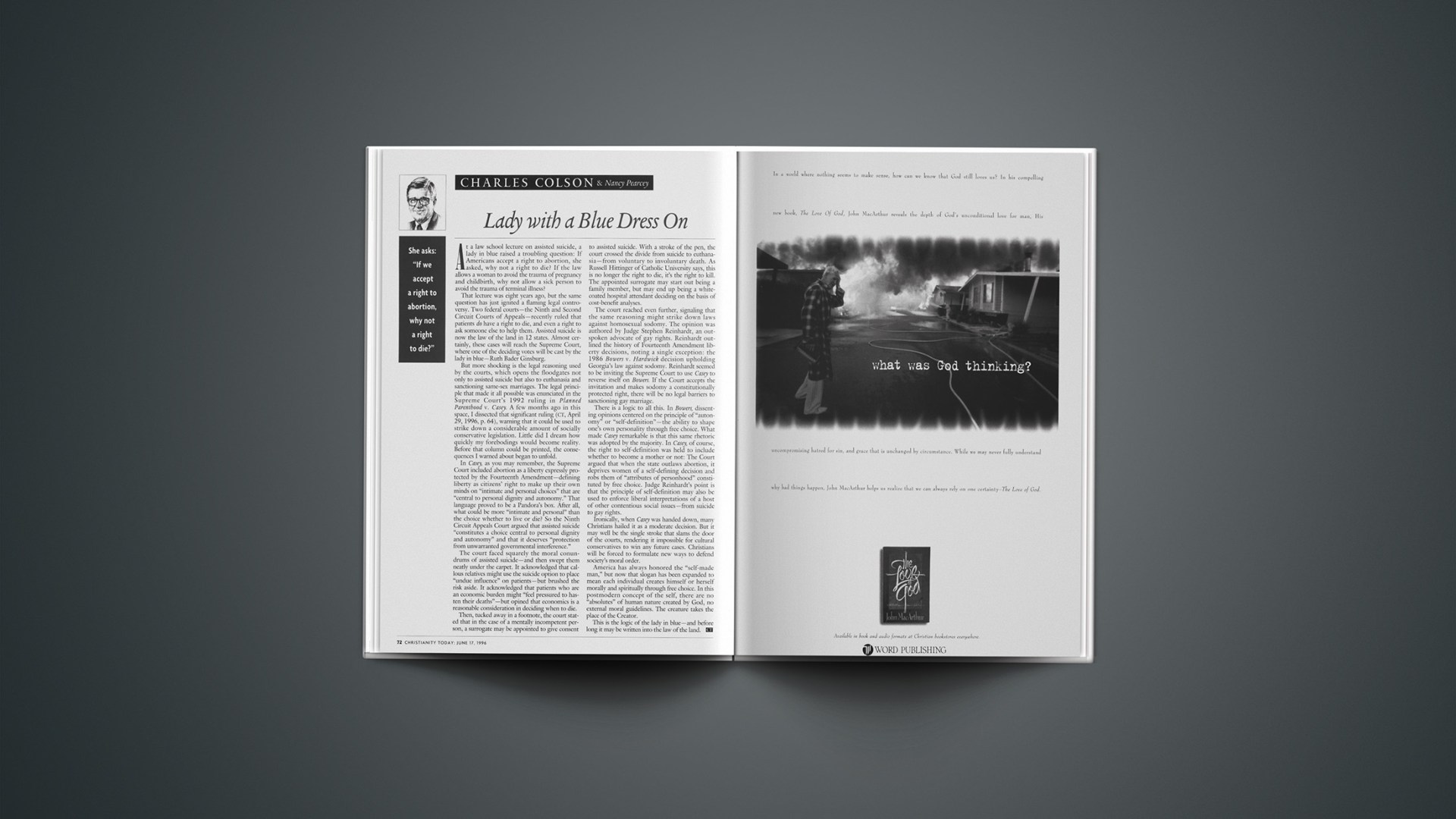She asks: “If we accept a right to abortion, why not a right to die?”
At a law school lecture on assisted suicide, a lady in blue raised a troubling question: If Americans accept a right to abortion, she asked, why not a right to die? If the law allows a woman to avoid the trauma of pregnancy and childbirth, why not allow a sick person to avoid the trauma of terminal illness?
That lecture was eight years ago, but the same question has just ignited a flaming legal controversy. Two federal courts–the Ninth and Second Circuit Courts of Appeals–recently ruled that patients do have a right to die, and even a right to ask someone else to help them. Assisted suicide is now the law of the land in 12 states. Almost certainly, these cases will reach the Supreme Court, where one of the deciding votes will be cast by the lady in blue–Ruth Bader Ginsburg.
But more shocking is the legal reasoning used by the courts, which opens the floodgates not only to assisted suicide but also to euthanasia and sanctioning same-sex marriages. The legal principle that made it all possible was enunciated in the Supreme Court’s 1992 ruling in Planned Parenthood v. Casey. A few months ago in this space, I dissected that significant ruling (CT, April 29, 1996, p. 64), warning that it could be used to strike down a considerable amount of socially conservative legislation. Little did I dream how quickly my forebodings would become reality. Before that column could be printed, the consequences I warned about began to unfold.
In Casey, as you may remember, the Supreme Court included abortion as a liberty expressly protected by the Fourteenth Amendment–defining liberty as citizens’ right to make up their own minds on “intimate and personal choices” that are “central to personal dignity and autonomy.” That language proved to be a Pandora’s box. After all, what could be more “intimate and personal” than the choice whether to live or die? So the Ninth Circuit Appeals Court argued that assisted suicide “constitutes a choice central to personal dignity and autonomy” and that it deserves “protection from unwarranted governmental interference.”
The court faced squarely the moral conundrums of assisted suicide–and then swept them neatly under the carpet. It acknowledged that callous relatives might use the suicide option to place “undue influence” on patients–but brushed the risk aside. It acknowledged that patients who are an economic burden might “feel pressured to hasten their deaths”–but opined that economics is a reasonable consideration in deciding when to die.
Then, tucked away in a footnote, the court stated that in the case of a mentally incompetent person, a surrogate may be appointed to give consent to assisted suicide. With a stroke of the pen, the court crossed the divide from suicide to euthanasia–from voluntary to involuntary death. As Russell Hittinger of Catholic University says, this is no longer the right to die, it’s the right to kill. The appointed surrogate may start out being a family member, but may end up being a white-coated hospital attendant deciding on the basis of cost-benefit analyses.
The court reached even further, signaling that the same reasoning might strike down laws against homosexual sodomy. The opinion was authored by Judge Stephen Reinhardt, an outspoken advocate of gay rights. Reinhardt outlined the history of Fourteenth Amendment liberty decisions, noting a single exception: the 1986 Bowers v. Hardwick decision upholding Georgia’s law against sodomy. Reinhardt seemed to be inviting the Supreme Court to use Casey to reverse itself on Bowers. If the Court accepts the invitation and makes sodomy a constitutionally protected right, there will be no legal barriers to sanctioning gay marriage.
There is a logic to all this. In Bowers, dissenting opinions centered on the principle of “autonomy” or “self-definition”–the ability to shape one’s own personality through free choice. What made Casey remarkable is that this same rhetoric was adopted by the majority. In Casey, of course, the right to self-definition was held to include whether to become a mother or not: The Court argued that when the state outlaws abortion, it deprives women of a self-defining decision and robs them of “attributes of personhood” constituted by free choice. Judge Reinhardt’s point is that the principle of self-definition may also be used to enforce liberal interpretations of a host of other contentious social issues–from suicide to gay rights.
Ironically, when Casey was handed down, many Christians hailed it as a moderate decision. But it may well be the single stroke that slams the door of the courts, rendering it impossible for cultural conservatives to win any future cases. Christians will be forced to formulate new ways to defend society’s moral order.
America has always honored the “self-made man,” but now that slogan has been expanded to mean each individual creates himself or herself morally and spiritually through free choice. In this postmodern concept of the self, there are no “absolutes” of human nature created by God, no external moral guidelines. The creature takes the place of the Creator.
This is the logic of the lady in blue–and before long it may be written into the law of the land.
Copyright © 1996 Christianity Today. Click for reprint information.










